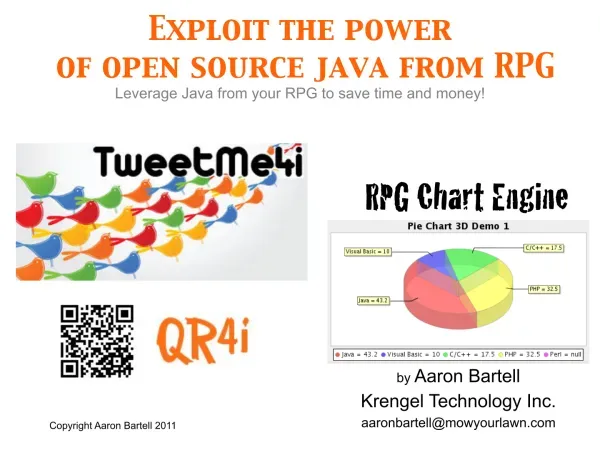
Leveraging Open Source Java in RPG Applications
Document information
| Author | Aaron Bartell |
| School | Krengel Technology Inc. |
| Year of publication | 2011 |
| Place | Mankato, MN |
| Document type | essay |
| Language | English |
| Number of pages | 37 |
| Format | |
| Size | 2.24 MB |
- RPG
- Java
- Open Source
Summary
I. Introduction to Open Source Java in RPG
The integration of Open Source Java into RPG applications represents a significant advancement in programming capabilities. This document outlines how RPG's Java interface extensions can be utilized to leverage the vast resources available through Open Source Java applications. By employing these extensions, developers can enhance their RPG programs, ultimately saving both time and money. The session provides practical examples, illustrating how to interface with various APIs, including the Twitter API for sending status updates directly from RPG programs. The ability to create QR codes using ZXing APIs further exemplifies the potential of Open Source Java in modern application development. As noted, 'Leave this session with an understanding of how the performance of such Java utilities can be improved through the use of server job and data queue interfaces.' This highlights the practical applications of the discussed technologies.
II. Practical Applications of RPG and Java Integration
The document delves into specific tools and applications that facilitate the integration of RPG with Open Source Java. Notable tools include OpenRPGUI, RPGMail, and the RPG Chart Engine, which allow RPG to communicate with web and mobile platforms. The TweetMe4i interface is particularly significant, enabling RPG programs to send updates to Twitter, thus enhancing business communication strategies. The document states, 'Twitter is becoming “something” and is being used more and more in business scenarios for notifying customers and marketing purposes.' This underscores the growing importance of social media integration in business applications. Additionally, the QR4i tool demonstrates how to create QR codes dynamically, catering to the increasing demand for mobile-friendly solutions. The use of Open Source Java in these contexts not only streamlines processes but also opens new avenues for innovation.
III. Technical Implementation and Best Practices
The technical implementation of Open Source Java within RPG applications is crucial for developers seeking to maximize efficiency. The document provides detailed examples of coding practices, such as the use of prototypes for Java methods and the configuration of the Java environment. For instance, the setup of the CLASSPATH is essential for ensuring that Java applications run smoothly within the RPG environment. The excerpt, 'Note that this only needs to be called once per job,' emphasizes the importance of efficient resource management. Furthermore, the document outlines best practices for error handling and data conversion between RPG and Java, which are vital for maintaining application integrity. By following these guidelines, developers can significantly enhance the performance and reliability of their RPG applications.
IV. Conclusion and Future Directions
In conclusion, the integration of Open Source Java into RPG applications offers numerous benefits, including enhanced functionality and improved user experience. The document encourages developers to explore the various tools and APIs available, as they can lead to innovative solutions in business applications. The potential for future developments in this area is vast, particularly as technology continues to evolve. As stated, 'The JVM doesn’t start with the RPG cycle and instead starts when the first Java method is invoked with the RPG program.' This indicates a shift in how applications can be structured, allowing for more dynamic and responsive programming paradigms. The ongoing exploration of Open Source Java in RPG will undoubtedly yield further advancements, making it a critical area for continued research and development.
Document reference
- RPG Chart Engine (Aaron Bartell)
- TweetMe4i (Aaron Bartell)
- QR4i (Aaron Bartell)
- ZXing (The ZXing Project)
- JFree.org APIs (The JFree Project)
